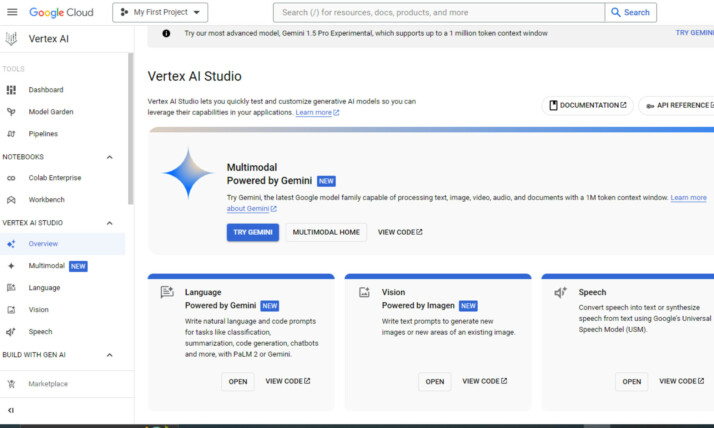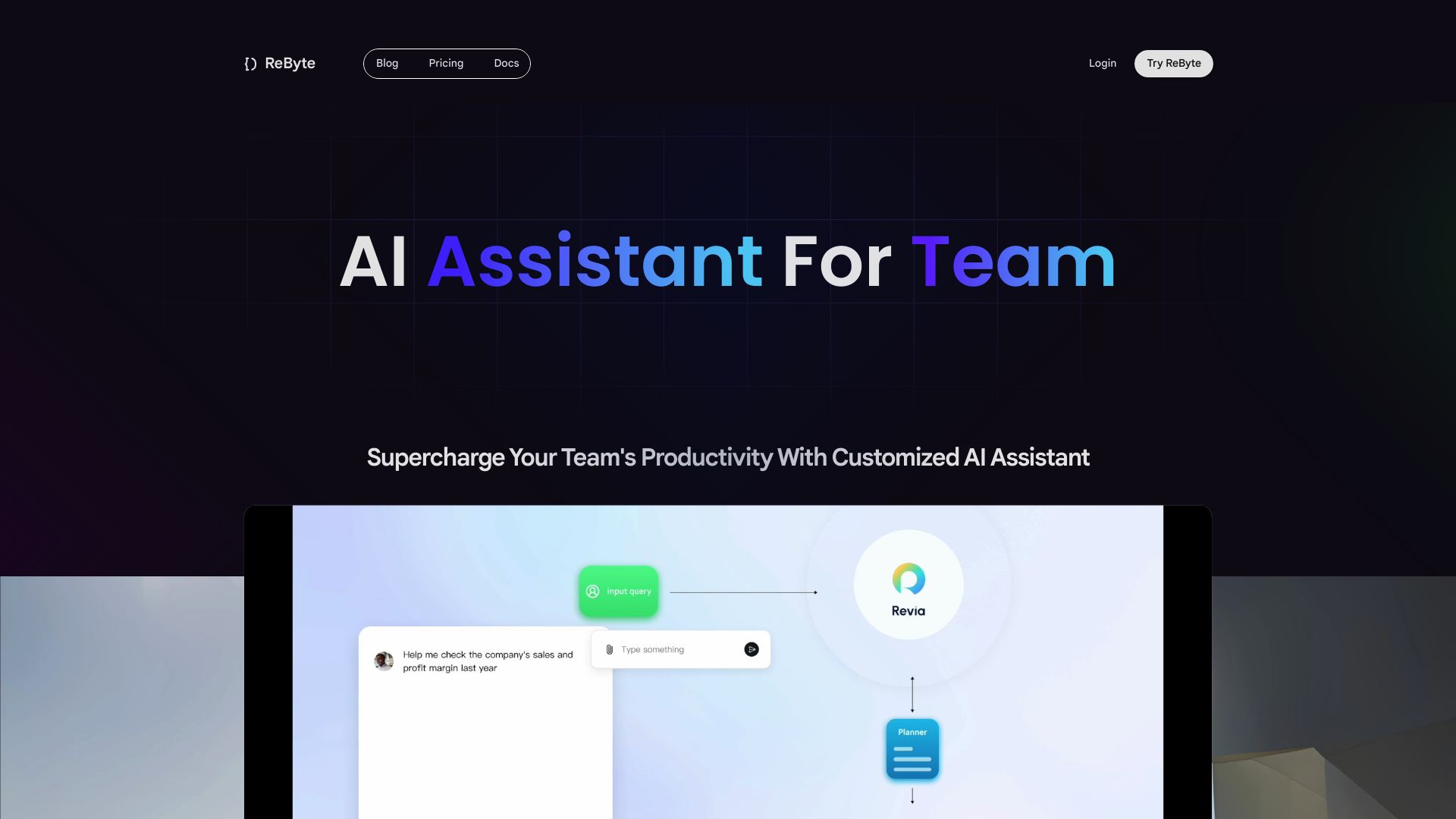Vertex AI vs. Rebyte: Comparing AI Development Platforms
AI development platforms revolutionize how businesses create and deploy intelligent solutions. Vertex AI vs. Rebyte, and SmythOS each offer unique approaches to harness AI’s power. Vertex AI, Google Cloud’s comprehensive machine learning platform, caters to enterprises with robust MLOps capabilities. Rebyte focuses on rapid AI application development through visual interfaces, democratizing AI for non-technical users. SmythOS emerges as the superior choice, combining powerful drag-and-drop interfaces with extensive customization options. This comparison explores each platform’s strengths, limitations, and ideal use cases, helping you select the best AI development solution for your needs.
Vertex AI Overview
Vertex AI unifies Google Cloud’s machine learning tools into a comprehensive platform for building, deploying, and managing AI models. The platform caters to developers, data scientists, and enterprises seeking to harness the power of AI across various applications.
Vertex AI’s standout feature is its Gemini multimodal generative AI model. Gemini processes text, images, audio, and video inputs, enabling advanced reasoning, multiturn chat, and code generation. This versatility makes it suitable for creating sophisticated AI agents and applications across industries.


Vertex AI’s standout feature is its Gemini multimodal generative AI model. Gemini processes text, images, audio, and video inputs, enabling advanced reasoning, multiturn chat, and code generation.
The platform’s Model Garden offers a diverse library of pre-trained models, including Google’s proprietary offerings and select open-source options. Users can customize these models to fit specific use cases, improving cost-efficiency and response times. Vertex AI also provides tools for model tuning, request augmentation, and integration with external APIs, enhancing the flexibility and power of AI implementations.
For enterprises, Vertex AI delivers robust MLOps capabilities. The Model Registry centralizes version management, while the Feature Store efficiently serves machine learning features. These tools, combined with performance monitoring and workflow orchestration, streamline the entire AI lifecycle from development to production.
Vertex AI’s commitment to democratizing AI is evident in its user-friendly interface and comprehensive documentation. However, the platform still requires a solid understanding of machine learning concepts and some coding knowledge, which may present a learning curve for non-technical users. The integration with Google Cloud’s broader ecosystem offers powerful synergies but may also lead to potential lock-in concerns for some organizations.
Rebyte Overview
Rebyte empowers users to rapidly develop AI-powered applications without extensive coding skills. The platform’s visual agent builder enables creation of customizable AI agents with multi-step workflows using large language models. Users can design complex backend logic and fully customized user interfaces without writing code.
Rebyte’s serverless runtime handles hosting, orchestration, testing, and production deployment of AI agents. This end-to-end approach manages the entire lifecycle of generated AI applications with minimal manual coding required. The platform integrates with private data sources and provides detailed observability into every step of an agent’s operations.
Rebyte empowers users to rapidly develop AI-powered applications without extensive coding skills. The platform’s visual agent builder enables creation of customizable AI agents with multi-step workflows using large language models.


Key differentiators include Rebyte’s focus on democratizing AI application development for knowledge workers and teams. The platform aims to boost productivity through no-code interfaces that enable end-user programming. This vision positions Rebyte to usher in an era where anyone can transform ideas into deployed AI applications simply by describing their goals.
Rebyte’s focus on democratizing AI application development for knowledge workers and teams. The platform aims to boost productivity through no-code interfaces that enable end-user programming.
While Rebyte offers powerful capabilities for rapid AI development, it may have limitations for highly specialized use cases requiring extensive customization. The platform’s no-code approach excels at accelerating common AI workflows but could potentially constrain advanced users needing fine-grained control. Overall, Rebyte provides an accessible entry point for organizations looking to harness AI’s potential without significant technical barriers.
Feature Comparison
Vertex AI and Rebyte offer distinct approaches to AI development and deployment. Vertex AI provides a comprehensive machine learning platform with robust tools for model training and deployment, while Rebyte focuses on rapid AI application development through visual interfaces.
Vertex AI excels in enterprise-grade MLOps capabilities. Its Model Registry and Feature Store streamline model versioning and feature management. The platform also offers advanced explainability tools and supports deployment across Google Cloud’s infrastructure. However, Vertex AI requires more technical expertise, as it lacks a true no-code editor for model development.
Rebyte, in contrast, emphasizes accessibility for non-technical users. Its visual agent builder enables AI application creation without extensive coding. Rebyte’s serverless runtime handles deployment and scaling automatically. While this approach accelerates development for common use cases, it may limit flexibility for highly specialized applications requiring fine-grained control.
In terms of security, both platforms offer encryption and authentication features. However, Vertex AI’s integration with Google Cloud’s broader ecosystem provides more comprehensive security options, including IP control and advanced compliance tools. Rebyte’s security features, while present, may not match the depth of enterprise-grade offerings in Vertex AI.
Feature Comparison Table
| Vertex AI | Rebyte | SmythOS | |
|---|---|---|---|
| CORE FEATURES | |||
| No-Code Options | ❌ | ✅ | ✅ |
| Autonomous Agents | ✅ | ❌ | ✅ |
| Multimodal | ✅ | ❌ | ✅ |
| Multi-Agent Collaboration | ✅ | ❌ | ✅ |
| Audit Logs for Analytics | ❌ | ✅ | ✅ |
| SECURITY | |||
| Constrained Alignment | ✅ | ❌ | ✅ |
| Data Encryption | ✅ | ❌ | ✅ |
| OAuth | ✅ | ❌ | ✅ |
| IP Control | ✅ | ❌ | ✅ |
| COMPONENTS | |||
| Huggingface AIs | ❌ | ❌ | ✅ |
| Zapier APIs | ❌ | ✅ | ✅ |
| Classifiers | ✅ | ❌ | ✅ |
| Logic | ✅ | ❌ | ✅ |
| Data Lakes | ✅ | ❌ | ✅ |
| DEPLOYMENT OPTIONS (EMBODIMENTS) | |||
| Deploy as Webhook | ✅ | ❌ | ✅ |
| Staging Domains | ✅ | ❌ | ✅ |
| Production Domains | ✅ | ❌ | ✅ |
| API Authentication (OAuth + Key) | ✅ | ❌ | ✅ |
| Deploy as Scheduled Agent | ✅ | ❌ | ✅ |
| DATA LAKE SUPPORT | |||
| Sitemap Crawler | ❌ | ❌ | ✅ |
| YouTube Transcript Crawler | ❌ | ❌ | ✅ |
| URL Crawler | ✅ | ❌ | ✅ |
Best Alternative to Vertex AI and Rebyte
SmythOS stands out as the superior alternative to Vertex AI and Rebyte, offering a comprehensive AI automation platform that combines ease of use with powerful features. Our platform bridges the gap between complex enterprise solutions and simplified no-code tools, providing unmatched versatility for AI agent development and deployment.
Unlike Vertex AI’s steep learning curve and Rebyte’s limited customization options, SmythOS delivers a user-friendly drag-and-drop interface that doesn’t sacrifice advanced capabilities. We empower users to create sophisticated AI workflows without extensive coding knowledge, making AI development accessible to a broader audience while still catering to the needs of experienced developers.
SmythOS delivers a user-friendly drag-and-drop interface that doesn’t sacrifice advanced capabilities. We empower users to create sophisticated AI workflows without extensive coding knowledge…
SmythOS excels in its extensive integration ecosystem, supporting a wide range of APIs, AI models, and tools. This flexibility allows our platform to seamlessly fit into various business processes and workflows, surpassing the limited integration options offered by Rebyte. Additionally, our multi-agent orchestration capabilities enable the creation of collaborative AI systems, a feature not available in Rebyte and more advanced than Vertex AI’s offerings.
Security and scalability are paramount in SmythOS. We provide enterprise-grade security features, including data encryption, OAuth support, and IP control, addressing the limitations found in Rebyte’s security offerings. Our platform also ensures seamless scalability, supporting both small-scale projects and large enterprise deployments with equal efficiency.
By choosing SmythOS, users gain access to a comprehensive suite of features that combine the best of both worlds — the robustness of enterprise solutions like Vertex AI and the accessibility of no-code platforms like Rebyte. Our platform’s versatility, coupled with its intuitive design, makes it the ideal choice for businesses and developers looking to harness the full potential of AI automation efficiently and effectively.
Conclusion
Vertex AI, Rebyte, and SmythOS each offer unique approaches to AI development and deployment. Vertex AI provides a robust platform for enterprise-grade machine learning, excelling in MLOps capabilities and integration with Google Cloud’s ecosystem. Rebyte focuses on rapid AI application development through visual interfaces, making AI accessible to non-technical users.
SmythOS, however, stands out as the superior choice, combining the best of both worlds. Our platform offers a powerful drag-and-drop interface for creating complex AI workflows without extensive coding knowledge. This democratizes AI development while maintaining the flexibility needed for advanced use cases.
Unlike Vertex AI, which requires significant technical expertise, or Rebyte, which may limit customization options, SmythOS strikes an optimal balance. We provide extensive integration capabilities, supporting over 300,000 integrations and a wide range of AI models. This flexibility ensures that SmythOS can adapt to virtually any workflow or business process.
Furthermore, SmythOS’s “Create Once, Deploy Anywhere” approach sets it apart. Our AI agents can be seamlessly deployed across various platforms, from cloud services to chatbots and APIs. This versatility, combined with our comprehensive feature set including autonomous agents, multimodal support, and advanced security measures, makes SmythOS the ideal choice for businesses looking to harness the full potential of AI. Experience the future of AI development and deployment by exploring our diverse range of AI-powered agent templates or creating a free SmythOS account to get started today.
Last updated:
Disclaimer: The information presented in this article is for general informational purposes only and is provided as is. While we strive to keep the content up-to-date and accurate, we make no representations or warranties of any kind, express or implied, about the completeness, accuracy, reliability, suitability, or availability of the information contained in this article.
Any reliance you place on such information is strictly at your own risk. We reserve the right to make additions, deletions, or modifications to the contents of this article at any time without prior notice.
In no event will we be liable for any loss or damage including without limitation, indirect or consequential loss or damage, or any loss or damage whatsoever arising from loss of data, profits, or any other loss not specified herein arising out of, or in connection with, the use of this article.
Despite our best efforts, this article may contain oversights, errors, or omissions. If you notice any inaccuracies or have concerns about the content, please report them through our content feedback form. Your input helps us maintain the quality and reliability of our information.
